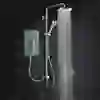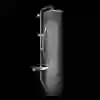Share:
For most of us, our showers are an essential part of daily life. Used several times throughout just one week alone, these bathroom fixtures need to be at their best performance to cope with the demands we place upon them.
Yet, just like any other household fixture, our showers may experience problems from time to time that can disrupt their functionality. From leaky shower heads to low water pressure, there are several common shower issues that homeowners may encounter.
The Bathroom Showroom understands the importance of keeping your shower at its peak condition to ensure all home members can experience a hassle-free showering experience every time. Here, we explore the most common shower issues in the UK while providing swift solutions to help you resolve them quickly and effectively.

Top 5 Most Common Shower Issues
Low Water Pressure
Low water pressure in the shower can be frustrating and can make it difficult to enjoy a refreshing shower experience, especially when you're trying to rinse off soap or shampoo.
There are several potential causes for low shower water pressure, including a clogged showerhead, a build-up of mineral deposits in the pipes, or occasionally a faulty pressure regulator. The most common cause here is hard water and its subsequent build-up of calcium, iron and limescale.
- Clean or Replace the Showerhead: A clogged showerhead can be a common culprit for low water pressure. By cleaning it or replacing it, you can improve the flow of water in your shower. Start by cleaning the shower head with a white vinegar solution to remove any mineral deposits. Place the shower head in a bag filled with the white vinegar and allow it to soak for an hour before gently cleaning the nozzles.
- Check the Pressure Regulator: If you suspect that the pressure regulator is the cause of the issue, have it inspected by a professional plumber. They will be able to determine if it needs to be adjusted or replaced.
- Inspect for Leaks: Take the time to inspect your plumbing system for any leaks that could be affecting the water pressure. If you find any leaks, have them repaired promptly to restore proper water flow.
- If you live in a hard water area, it may be worth considering purchasing a water softener for the bathroom. This will help better protect your plumbing system as it removes such problematic deposits from your water supply.

Temperature Fluctuations
Another common issue that homeowners face with their showers is temperature fluctuations, resulting in the water temperature suddenly going from hot to cold and back again. Not only is this annoying, but it can also make for uncomfortable showering, especially for those younger members of the home.
Shower temperature fluctuations can be caused by a faulty shower valve, incorrect water heater settings, water pressure issues, or even old or damaged plumbing.
- Check the Shower Valve: If you suspect that the shower valve is the cause of the temperature fluctuations, it may be time to replace it. A plumber can help you determine if the valve is the issue and install a new one if necessary.
- Adjust Water Pressure: Ensuring that your home's water pressure is consistent can help alleviate temperature fluctuations in the shower and promote a steady flow of water.
- Inspect the Plumbing: If you have old or damaged plumbing, it may be contributing to the temperature fluctuations in your shower. Inspecting the pipes for leaks, clogs, or other issues and addressing them can help improve water flow and temperature consistency.
- Check the Temperature Regulator: If your shower is equipped with a temperature regulator, make sure it’s functioning properly. This can be repaired or replaced to help maintain a consistent water temperature.

Leaks or Drips
A leaking shower is an annoying issue but one that’s often a common problem faced by many homeowners. Yet, if left unchecked, overtime it can also lead to water damage.
This can be caused by worn-out washers, damaged seals or gaskets, or loose connections. However, leaky or dripping showers are often relatively simple and inexpensive fixes.
- Tighten the connections: Use a wrench to tighten the connections between the shower head and the shower arm. This can help stop minor leaks caused by loose connections.
- Replace the washer: If the leak is coming from the shower head itself, try replacing the washer. Simply unscrew the shower head, remove the old washer, and replace it with a new one.
- Use Teflon tape: If the leak is coming from the shower arm, wrap some Teflon tape around the threads to create a tight seal.

Noisy or Rattling Shower
If you've noticed your shower making unusual noises, you're not alone. Many homeowners experience loud or strange sounds coming from their showers, and it can be quite concerning.
Such sounds are often in the form of rattling, banging, or squealing noises. But, as annoying and alarming as these sounds can be, they’re typically caused by a few common issues.
One of the most common reasons for a noisy shower is loose or improperly secured pipes. As water flows through the pipes, they may vibrate and create a rattling or banging noise.
- Tighten Loose Pipes: Inspect your pipes to see if any are loose or vibrating. Use pipe clamps or cushioning material to secure them in place and reduce noise.
- Adjust Water Pressure: If your water pressure is too high, try adjusting it at the main water supply valve. This can help reduce the vibrations in your pipes and quiet down your shower.
- Replace Shower Head: If mineral build-up is the issue, consider replacing your showerhead with a low-flow model. This can help minimise noise and improve water efficiency.

Slow Drainage
When your shower is slow to drain, or you begin to notice strange smells when using this space, you could be experiencing a clogged drain.
A clogged drain in the shower can lead to standing water, which is not only unsanitary but can also cause mould and mildew growth. A common bathroom problem, slow drainage is often caused by a build-up of of hair, soap scum, or other debris in the drain.
- Start by using a plunger or a drain snake to break up the blockage. Then run warm water down the drain for a few minutes to clear. You can also add a natural solution here, such as bicarbonate of soda with lemon to help flush and clear the area.
- If that doesn't work, you may need to use a more powerful drain cleaner that’s designed to target the blockage and clear it fast.
- Prevent future clogs by using a hair strainer in the shower drain to catch hair and soap scum before it causes a blockage.
- Regularly cleaning the drain can help prevent future blockages and maintain proper drainage.
Keep Your Shower Functioning By Fixing Shower Issues Straightaway
Dealing with common shower problems can be frustrating, but with the right troubleshooting tips, you can quickly resolve most issues on your own. Remember to always turn off the water supply before attempting any repairs and don't hesitate to call a professional plumber if you're unsure of how to fix the problem or if these problems persist.
By following the tips outlined in this article, you can keep your shower in working order and enjoy a relaxing and hassle-free bathing experience.
If you’re looking for further help with choosing the best shower for your space, book an appointment with The Bathroom Showroom. Experts in all things bathrooms, we can help turn your dream bathroom into a reality.
